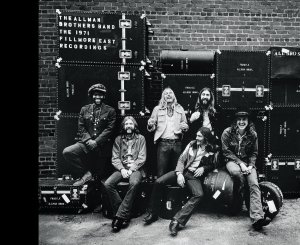Artist:
Album:
Label:
Release Date:
 To some, having enough Allman Brothers music is analogous to eating all the peaches on a tree. It’s just not possible. Accordingly, to set aside all the time it takes to appreciate these six CDs worth of five full Allman Brothers Band shows becomes a matter of perspective. Featuring a 24 year-old Duane Allman on guitar just seven months before he perished in a motorcycle accident, this original incarnation climbs to the ultimate of several pinnacles that they and subsequent editions would reach during an overall 45-year lifespan. Seven of these 37 performances were originally released as At Fillmore East, the album that introduced the world to the band’s virtuosic melding of rock, jazz, and the blues. Three more showed up appended to their next timeless album, Eat a Peach, while others were released in dribs and drabs on various compilations.
To some, having enough Allman Brothers music is analogous to eating all the peaches on a tree. It’s just not possible. Accordingly, to set aside all the time it takes to appreciate these six CDs worth of five full Allman Brothers Band shows becomes a matter of perspective. Featuring a 24 year-old Duane Allman on guitar just seven months before he perished in a motorcycle accident, this original incarnation climbs to the ultimate of several pinnacles that they and subsequent editions would reach during an overall 45-year lifespan. Seven of these 37 performances were originally released as At Fillmore East, the album that introduced the world to the band’s virtuosic melding of rock, jazz, and the blues. Three more showed up appended to their next timeless album, Eat a Peach, while others were released in dribs and drabs on various compilations.
Although not the “best” takes, the twists in tempo, fluctuations in Gregg Allman’s bourbon-smooth voice, and the sparks of passion flying from Duane Allman and Dickey Betts’s guitars do highlight 14 previously unreleased songs, rendering them only slightly less fantastic than the ones found on one of rock music’s most revered live albums. But also among those selections is the quite-obvious justification for producer Tom Dowd to blow a gasket as he did when the band invited a sax player onstage without his knowledge. Betts’s monumental instrumental “In Memory of Elizabeth Reed” needed that like a hole in its head, but it’s still cool to hear.
Betts and Gregg Allman wrote music and words that painted sweeping landscapes and told stories eloquently, but with fearless mettle. Side by side with blues classics like T-Bone Walker’s velvety “Stormy Monday” and Muddy Waters’ tumultuous “Trouble No More,” Betts’ jazzy opus and Allman’s wicked “Whipping Post,” for instance, fit in the same picture like the pieces of a grand jigsaw puzzle. The unending endurance of this music goes way beyond the incredibly symbiotic, exciting guitar soloing. The Allman Brothers were a band. Whether Allman’s Southern-fried funky “Don’t Keep Me Wonderin’,” or their adventurous tackling of Willie Cobbs’ “You Don’t Love Me,” every instrument was integral to the statement. Surely this was, and is, one hell of an album, one very worthy of this lavish presentation all these years later.
– Tom Clarke







Be the first to comment!